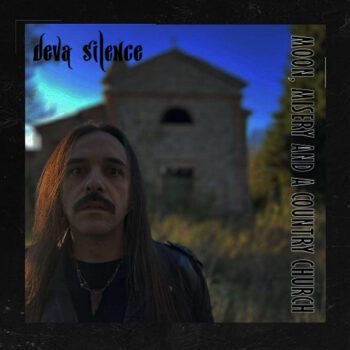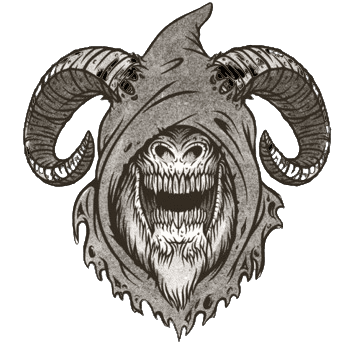Deva Silence is an Italian Doom Metal band blending heavy riffs and atmospheric melodies. On September 20th, 2024, Deva Silence released their latest release, entitled “Moon, Misery And A Country Church,” and released via The Triad Rec.
Deva Silence, Moon, Misery And A Country Church Review: This review will evaluate every aspect of the album, from its intricate musical composition to its production. Our analysis will provide valuable insights to help you determine if this album is worth adding to your collection.
The First Three Sins, The Summary
The First Sin, The Strings/Keys: Features gritty, heavy-doom riffs with a progressive edge, bluesy phrasing, harmonized solos, while the rhythm evokes a Sabbath-like ambiance. The bass lines provided a backbone to the music. The Second Sin, The Vocals: Delivers a vocal range that is gritty, passionate, and occasionally theatrical. The Third Sin—The Percussions: Delve into a vast world of traditional doom beats and rhythms, with a strong emphasis on ride cymbals, floor toms, and piercing snare hits.
The Fourth Sin, Overall Discussion
Upon pressing the play button, the listener is welcomed by the opening track, Dream Wolf, which envelops them in a sombre, Sabbathian-inspired atmosphere accompanied by hauntingly doomy vocals.
Deva Silence‘s album, Moon, Misery and a Country Church, provides the listener with nine tracks that total fifty minutes. With Gothic undertones, the music skilfully blends elements of Italian progressive rock, the new wave of British heavy metal, and doom metal from the 1970s. “Hard’N’Loud” is how Deva Silence describes this unusual sound. The lyrics weave stories that are authentically relatable, drawing from both real-life experiences and television dramas.
With their gritty riffs and progressive edge, Deva Silence’s epic, dark, and introspective heavy-doom metal provides a fruit of art release. In addition to being incredibly personal, this music has a strong connection to the history of European heavy music. The composition and arrangement are delivered by this fruit of art, devilmanship. They skilfully combine heavier distorted parts, balanced tempos, progressive elements, and an engrossing atmosphere. Here, the music explores mood, narrative, and rich textures in addition to heavy riffs.
Moon, Misery and a Country Church embodies a DIY spirit with a strong sense of artistic direction, presenting a production style that feels both analogue and partially digital. The sound avoids the harsh “brick-walled” loudness that characterises modern music in favour of warmth, rich saturation, and plenty of headroom. The album has a nostalgic feel thanks to deliberate reverb and a natural atmosphere, especially on the drums and vocals. It embraces flaws as an essential component of its emotional energy and purposefully avoids a contemporary or extremely polished sound.
Deva Silence’s guitar playing showcases a profound respect for the essential sounds of 1970s doom and British heavy metal, drawing inspiration from icons like Tony Iommi and Ritchie Blackmore, while also incorporating elements of progressive rock. Deva Silence’s rhythmic riffs are slow to moderate in tempo, often bass in the pentatonic minor scale, and employ bluesy bends and tritone intervals to create a Sabbath-like atmosphere. The riffs’ progression also has a structural, nearly cinematic feel, with intros that evolve like musical movements.
Alex Nespoli’s lead and acoustic guitar contribute a melodic quality that skilfully counterbalances that song’s dark aspects. A rich soundscape is produced by his bluesy phrasing, harmonized solos, slides, wah-effects, and slow bends. Additionally, he incorporates clean arpeggios and acoustic textures, especially in intros and transitions, which enhances the band’s progressive flair. Deva Silence, who also takes on vocal duties and plays bass, delivers a vocal range that is gritty, passionate, and occasionally theatrical.
Deva Silence bass lines are prominent and fuzzy, reminiscent of early Geezer Butler or Lemmy Kilmister, standing out rather than being overshadowed by the guitar. Massimiliano Martellotta, drums provide a strong foundation based on traditional doom beats and rhythms, with a strong emphasis on ride cymbals, floor toms, and piercing snare hits. All things considered, every song is a mood piece that is meant to evoke feelings, thoughts, and memories in addition to headbanging.
The album concludes with its final track, Notice Of Death. As the music fades into the darkness. We want to give a shoutout to, The Triad Rec for letting us review Deva Silence‘s album, Moon, Misery and a Country Church. Now, we are going to conclude the review by talking about the final three sins and concluding the review.
The Fifth Sin, The Memorabilia
Deva Silence and his album, Moon, Misery and a Country Church, strike a unique balance between classic heavy metal and doom, infused with elements of experimental and progressive rock, which I found thoroughly enjoyable. This album has a timeless quality, as if it were unearthed from a dusty attic. Additionally, I have a particular fondness for the fifth piece, Dirty Love. The whole album, for me, embodies this weighty sound of Black Sabbath, the haunting epicus of Candlemass, and progressive and Gothic nuances, all while incorporating a hint of King Diamond‘s sinister flair.

The Sixth Sin, The Artwork
The artwork is…
The Seventh Sin, Disrelish
Before wrapping up the review, there is one thing to disrelish within the musical universe of Deva Silence. It is the artwork, my apologies, “Deva Silence and Triad Rec.” Thus, we conclude our review of Deva Silence and his album, Moon, Misery and a Country Church. I would like to take this opportunity to express my gratitude for your time in reading this article, and I encourage you to explore the work of The Triad Rec as well as Deva Silence.
Track-Listing
01. Dream Wolf
02. Bad Smell
03. Black Star
04. Moon & Misery
05. Dirty Love
06. Call Me
07. Hide The Dark
08. Slave Of Doom
09. Notice Of Death
Members
Deva Silence — Bass, Rhythm Guitar & Vocals
Massimiliano Martellotta — Drums
Alex Nespoli — Lead and Acoustic guitar

